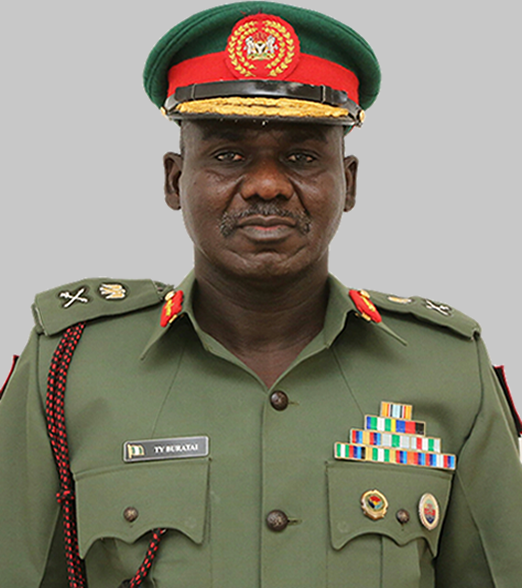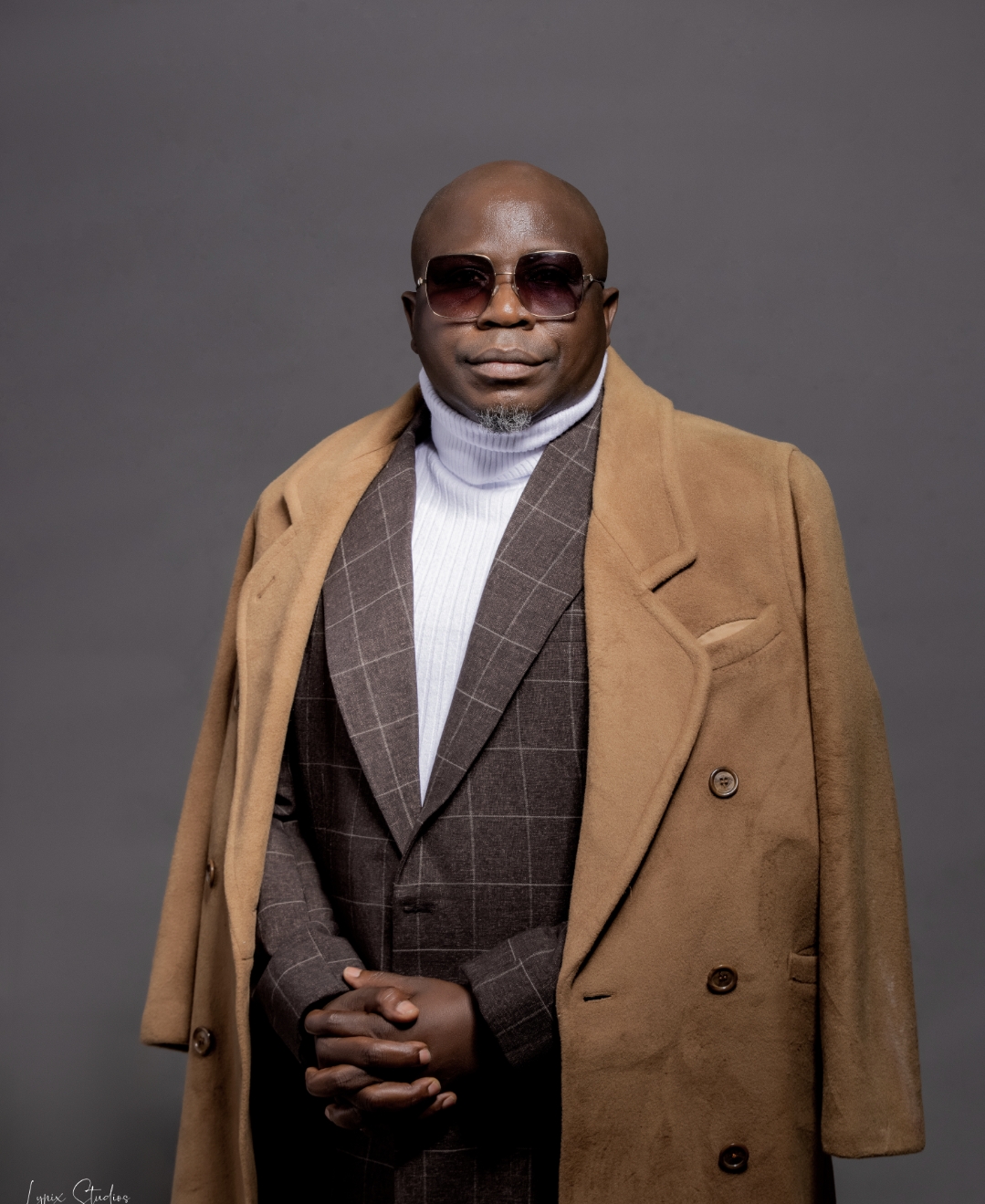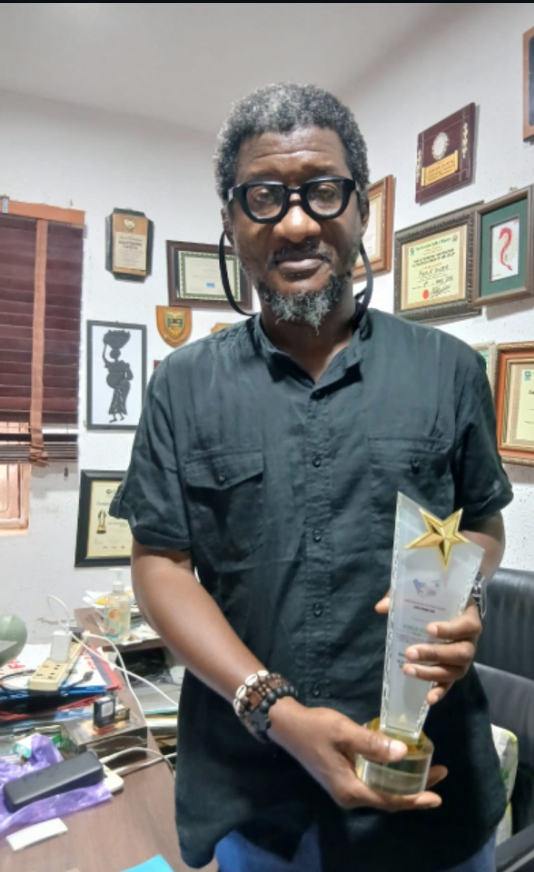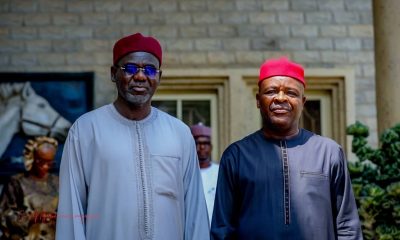celebrity radar - gossips
HURIWA, AFRIRIGHTS Tell Foreign Embassies To Disregard Eastern Coalition Letter Against Buratai

Foremost Civil Rights Advocacy Group:- HUMAN RIGHTS WRITERS ASSOCIATION OF NIGERIA (HURIWA) has asked foreign embassies in Nigeria to discountenance allegations of human rights violations made against immediate past Army Chief of Nigeria Lieutenant General Tukur Yusuf Buratai by a group known as the Eastern Rights and Intelligentsia Coalition.
Besides, the Rights groups informed the foreign embassies in Nigeria that General Buratai as well as other immediate past service Chiefs recently named as envoys by President Muhammadu Buhari, are reputable Nigerian statesmen with unblemished records of professional services rendered to Nigeria and have no case in any local or international judicial fora.
The letters to the 31 foreign embassies in Nigeria by HURIWA and AFRIRIGHTS were sent against the backdrop of earlier letters to same embassies by the Eastern Rights and intelligentsia coalition in which they reportedly canvassed the prosecution of the former Service Chiefs at the international criminal court (ICC) in the Hague, Netherlands for crimes against humanity and human rights breaches.
The Right groups through the National Coordinator of HURIWA Comrade Emmanuel Onwubiko and the National Media Affairs Director Miss. Zainab Yusuf, categorically stated that rather than recrimination and casting undue aspersions in a bid to ridicule the public standing and assassinate the character of General Buratai and other former military Chiefs, these persons who had only just voluntarily retired from Nigeria Military after 40 years deserve accolades and National awards for their undiluted services to Nigeria.
The names of the petitioned 31 key foreign missions are the Head of Delegation of EU and the Ambassadors of Netherlands, Finland, Poland, Federal Republic of Germany, France, Spain, Czech Republic, Italy, Belgium, Denmark, Portugal, Greece, Austria, Hungary, Bulgaria, Slovakia and Sweden. Others are the High Commissioners of the United Kingdom, Australia and Canada and the Ambassadors of the United States, Israel, Norway, Ireland, Switzerland, Brazil, Japan, South Korea, Mexico and the Apostolic Nuncio to Nigeria.
Excerpts from the letters to the embassies by HURIWA and ARIRIGHTS dated February 12th 2021 reads thus:
“Contrary to insinuations and allegations by some groups under the aegis of Eastern Rights and Intelligentsia Coalition against General Tukur Buratai, we hereby on behalf of over eighth thousand members and over 36 registered affiliates, humbly write you this letter to bring your Excellency, up to speed, with what the immediate past Chief of Army Staff General Buratai adopted to resolve alleged Human Rights Violations by soldiers.
The past six years have seen Boko Haram atrocities in the northern part of Nigeria raising serious internal insecurity issues and international uproar by its tendency to strike freely, killing and maiming with destruction. These have thus attracted the reliance of the Nigeria government on the military action to deal with Boko Haram.
It is vital to note first that, the Nigerian Police are statutorily charged with ensuring internal security and public order but the complexity of the threat has seen the army aiding the police.
Pertinent to mention that the involvement of the armed forces in the fight against Boko Haram enjoyed legal backing in the Nigeria’s Constitution and the Armed Forces Act, which empowers the President as the Commander-in-Chief of the Armed Forces to determine its operational use.
Section 8(1), also provides that, the President shall determine the operational use of the Armed Forces, but may, under general or special directives, delegate his responsibility for the day-to-day operational use.
Section 8(3) of the same Act clarifies that, the operational use of the armed forces in Nigeria includes its use for the purpose of maintaining and securing public safety and public order.
With the absence of war with other states around the world, in maintaining Nigeria’s territorial integrity and securing its borders, the armed forces have been deployed more to suppress insurrections and assisting, mostly the Police and Nigerian Securities and Civil Defence Corps in the storm of ugly disturbances in different parts of Nigeria, especially in dealing with Boko Haram insurgency among others.
Pertinent to mention that the struggle by the Nigerian army to combat the Boko Haram insurgents changed with the reorganization of the military, notably the appointment of Lt. Gen Tukur Yusuf Buratai as Chief of Army Staff and relocation of the military command structure to Borno State by President Muhammadu Buhari in 2015.
*2.0 ALLEGATIONS OF HUMAN RIGHTS ABUSES*
It is a truism that the primary roles of the Nigerian Army are to protect the territorial integrity of Nigeria and to assist the civil authority when called upon to do so. Noticeably, in discharging these constitutional responsibilities, there have been allegations of human rights violations against the Nigerian Army by local and international human rights campaigners, – Civil Society Groups and Non-Governmental Organizations like the Amnesty International, Transparency International and Human Rights Watch among others.
One of the organisations that constantly kept the Nigerian Army on its toes is the Amnesty International; an international rights watchdog which constantly released negative reports on the Army’s handling of human rights issues.
For the purposefulness, we shall only concentrate on allegations during when Lt. Gen TY Buratai held sway as the Army Chief.
These allegations border mainly on extra judicial killings, torture, extortion, arbitrary arrest and detention as well as sexual philandering or exploitation. Others are poor detention facility and pitiable medical access and supplies to suspects in military detention centers.
These claims portrayed the Nigerian Army in bad light, created rancour and distrust between the army and the civil populace, dampened the morale of troops in the operational arenas, almost distracted the military leadership and maligned the image and reputation of the Nigerian Army.
In order to respond and or address these accusations, the Chief of Army Staff; Lieutenant General Tukur Yusuf Buratai (as he then was), initiated and institutionalized certain measures intended to eliminate rights abuses by the personnel of the Nigerian Army.
*3.0 UNPRECEDENTED EFFORTS TO CHECKMATE HUMAN RIGHTS ABUSES*
On assumption of duty in July 2015, Lt Gen TY Buratai was never in doubt as to the enormous challenges he has to surmount in order to restore the dignity of an army and the nation terribly shattered by Boko Haram terrorists.
As a disciplined military strategist, he understood the key roles of excellent Civil Military Relations/Cooperation particularly in a period of multiple and dynamic security challenges such as terrorism, farmers – herdsmen clashes and violent secessionist agitation among others.
To this end, he instantly reorganized and empowered the Department of Civil – Military Affairs (DCMA) to function effectively, especially in the campaign for the protection and respect for human rights by the Nigerian Army.
*3.1 Solidification the Department of Civil – Military Affairs*
The first step taken to checkmate human rights abuses was to rejig and strengthen the DCMA. Consequently, sensitization workshops and campaigns on protection of human rights where dynamically conducted for members of the NA.
Similarly, corporate social responsibility projects like construction of boreholes, feeder roads, renovation of medical centres and schools among others across selected communities in Nigeria where conducted particularly during operations and exercises. This endeared the troops to the locals and ushered in a sense of togetherness and mutual respect.
Likewise, the Nigerian Army through the department, partnered with some human rights organizations such as the United Nations (UN) Office for the Coordination of Humanitarian Affairs to develop capacity that will enhance professionalism and responsiveness in promoting humanitarian principles and conduct during operations.
Such human rights sensitization workshops harped on operational civil – military interactions, humanitarian principles, perception, actions, guidelines, security and coordination as well as humanitarian access.
Perhaps worthy of mention is that while declaring human rights workshop open in 8 Task Force Division, the Chief of Civil – Military Affairs; Maj Gen Nuhu Angbazo (as he then was), who represented the COAS stated that “the Nigerian Army has embarked on the sensitization workshop so that our troops can become knowledgeable in the Laws of Armed Conflicts and therefore avoid those unprofessional conducts that could destroy their career and tarnish the good image of the Nigerian Army” (Vanguard, Jun 2018).
*3.2 Setting up of Human Rights Desk*
Another laudable initiative by the Buratai’s leadership in its consistent efforts to checkmate right abuses was the establishment of Human Rights Desk at the Army Headquarters and in all the formation headquarters across the nation.
The functions of the human rights desk, which include receiving documents, investigating complaints from individuals, organizations and institutions on rights violations involving Nigerian Army personnel, made findings to the COAS on human rights complaints in the country while producing annual reports and reviews.
Others are to update existing training manuals, liaising and facilitating interaction with human rights organizations, strategize and strengthen capacity of the Nigerian Army in promoting human rights.
Incidentally, while commissioning the human rights office at the Headquarters of 7 Division Nigerian Army in Maiduguri, TY Buratai, who was represented by the Chief of Civil – Military Affairs expressed that the establishment of the desk office was borne out of the increasing interest of local and international rights bodies on what the army is doing in the North East and other parts of Nigeria.
“The Nigerian Army is trying to open up the system and close the gap with the civil populace, human rights bodies and Civil Society Organizations; the nature of inquiries, commentaries and claims from these institutions requires a professional and specialized response by the Nigerian Army.
“What we are witnessing today has been facilitated by the Nigerian Bar Association and National Human Rights Commission”, he added. (Daily Post, 18 Feb, 2016).
*3.3 Establishment Of Toll Free Call Centre & Public Complaints Rapid Response Unit*
On 19 June 2018, at a Military – Media – Public Awareness Programme at Jabi Motor Park in Abuja organized by CLEEN Foundation, the COAS through the Army Human Rights Desk Officer, Major Naazem Langpoe (as he then was) stated that; “the army is passionate about the rights of civilians, and had measures in place to ensure that rights of civilians are protected”.
“These measures included the opening of Free Toll Line 193, designated Toll Free Call Centre and Public Complaints Rapid Response Unit”. The offices and the toll line 193 are opened to members of the public whose rights have been infringed upon; they can always walk in to the office and lodge their complaints.
Also Buratai, through Major Lanpoe added that the Army, during its first quarter staff conference for that year (2018) launched some books on respect for human rights during military operations.
“So, the Army is doing its best to ensure that the rights of the civilians are respected”.
Urging members of the public to relate with military and report to then any case of human right violation by the personnel, he added: “we assure them that once they come to us their rights are protected and we do our best to serve them better”. (Vanguard, June 19, 2018).
*3.4 Construction and Commissioning of Joint Investigation Centre and Cells for Boko Haram Suspects*
In response to complaints of human rights abuses of detainees due to poor state of the detention facility in Giwa Barracks Maiduguri, in the areas of poor sanitary condition/ventilation, overcrowding and irregular water supply, the COAS; TY Buratai (as he then was) on Friday April 29, 2018, commissioned 400 capacity Joint Investigation Centre and Detention Cells for Boko Haram suspects in Maiduguri.
The facilities where built with heat and odour extractor, coupled with constructed borehole to enable detainee’s access water.
Lt. Gen Buratai, who was represented by the then Theatre Commander, Operation LAFIYA DOLE; Major General Rogers Nicholas stated during the commissioning thus; “this modern facility will go a long way in changing the narrative in the criticism of the Nigerian military, this is a clear indication that we welcome positive criticisms to see where we can improve on it, and this is what we have demonstrated here”, he added (Leadership, 29 Apr, 2018).
*3.5 Construction of Additional Safe Holding Facility*
On the 15th of November 2018, the Nigerian Army’s leadership approved the commencement of the construction of additional holding facility to improve the management of detainees during investigations.
At the foundation laying ceremony, the Chief of Logistics, Nigerian Army; Major General Enobong Udoh (as he then was) stated that the ongoing counter terrorism and counter insurgency operations in the North East, has made it mandatory for arrest and detention of suspected insurgents who must be properly taken care of in accordance with international best practices while in custody.
According to him “the quest for a functional transit safe holding and detention facility, with adequate sanitary conditions for the effective management of suspected Boko Haram Terrorists for further investigation activities, is the driving force behind the execution of this project by the COAS”.
At the occasion, Mr. Markus Dolder, the Head of Sub Delegation of the ICRC, described the ground breaking ceremony as “indicative of the compliance of the NA with global best practices. This will further strengthen the cooperation between the army and stake holders, especially in the management of suspects undergoing investigation”. (The Nigerian Voice, November 16, 2018).
*3.6 Composition Of Special Board Of Inquiry To Probe Alleged Cases Of Human Rights Abuse*
Another commendable effort in response to probing and checkmating human rights abuses by the Nigerian Army was the establishment of Special Board of Inquiry by the COAS in March 2017, to probe alleged cases of human rights violations levelled against the Nigerian Army personnel, especially in the ongoing counter terrorism.
During the inauguration of the board, Lt Gen Buratai stated that “Mr. Buratai said that in spite of the success recorded by troops in the ongoing counter-terrorism operations in the North East, some individuals and organisations had expressed concerns”.
He explained that the individuals and organisations alleged cases of misconduct and human rights abuses by personnel of the army, “especially in the early days of the counter terrorism and counter insurgency operations.
Notably, the Amnesty International reports, Indigenous
People of Biafra (IPOB), other groups and individuals have made allegations of human rights violation of arrested Boko Haram terrorists against some of our senior officers and commanders.’’
He said based on those allegations, some officers were already suffering discrimination in some quarters. “The allegations range from extra-judicial executions, arbitrary arrests, detention, torture and enforced disappearance of suspected Boko Haram terrorists.
“These allegations are not good for civil-military relations and are capable of demoralising Nigerian army personnel in the performance of their constitutional roles.”
According to him, it is expedient to thoroughly and impartially investigate the allegations in order to find out the facts of the matter to enable relevant authorities to take appropriate actions.
He said the board was, therefore, set up to investigate the matter and establish the true situation of the whole allegations.
The Chief of Army Staff (as he then was) said that the board was set up in line with the provision of Section 172(1) of the Armed Forces Act CAP A20 Laws of the Federation of Nigeria, 2004.
Mr. Buratai, however, called on the board not to probe or revisit cases of abuse that had been investigated by state governments or the National Human Rights Commission.
He also urged members of the board to justify the confidence reposed in them as they were selected based on competence and merit to serve.
“I implore you to leave no stone unturned to come up with a report that will elucidate the facts to all and assist the Nigerian army in taking appropriate actions,” he said. (Premium Times, March 8, 2017).
*3.7 Enforcement/Application of Full Military Justice System to Human Rights Violators*
Regular, timely and effective enforcement of extant rules/application of sanctions to human rights violators is one of the ways the Nigerian Army uses to curtail human rights abuses by its personnel.
Under Buratai, any confirmed case of rights infraction was met with maximum punishment. This way, human rights abuses where also drastically curtailed in the Nigerian Army.
All these where deliberate efforts by the Nigerian Army under the leadership of Buratai to eliminate rights abuses by its personnel.
*4.0 EVALUATIONS AND CONCLUSION*
*4.1 Critical Appraisal*
There is no gainsaying the fact that the transformation of the Nigerian Army rapidly manifested under the leadership of the Chief of Army Staff; Lt. Gen Tukur Yusuf Buratai (Rtd) who was proactive in the war against terrorism despite efforts by moles and saboteurs embedded within the Army who were derailing the objectives of the counter Terror War and the efforts for the respect for fundamental human rights.
Perhaps, those still unconvinced by the impactful exceptional transformational measures contrived in repositioning the Nigerian Army for effective counter-insurgency combats and maintaining military – Civil relationship practices are certainly poor adherents of history or have a faulty retentive memory.
Not too long ago, as part of the activities marking the 2020 Nigerian Army Day Celebration together with its Cooperate Social Responsibility, Troops of the 7 Division Maidugiri conducted sanitation exercise along Baga road market, Maidugiri town in Borno State, while the newly built Camp Delta Force Quick Reaction Base was commissioned to enhance quick response of troops to terror activities in the communities.
Beyond this, upon assumption of office, Buratai and his Principal Officers monitored issues on allegation of human rights abuses against troops deployed for operations across the country in line with the President and Commander-in-Chief of the armed forces’ mandate in the fight against terrorism.
Again, through the establishment of Human Rights Desk Offices in the Army headquarters and across the Nigerian army divisions, the Army was able to address petitions and other different kind of claims against it.
This move, borne out of the increasing interest of the local and international human rights bodies on what Nigerian Army is doing in the North East and other parts of the country, to many human right analysts, marked a departure from the old order when the Military was on the defensive whenever allegations of human rights violations were levelled against it.
More so, while Buratai held sway, the Nigerian Army ensured that all cases pending in civil court against it where either assigned to competent registered Nigerian Army external advocates or military lawyers in the Directorate of Legal services.
Furthermore, Court Martial cases or trials in the field where also given professional attention by deploying legal officers, who are not only trained military personnel, but legal practitioners. This is in furtherance of the fact that the Nigerian Army as an institution is guided by appropriate legal advice in sustaining its flexibility in the conduct of its operations, which was being adequately acknowledged within the nation and the comity of other nations.
Adherence to the rule of law was consistent with Buratais’ vision to have a professionally responsive Nigerian Army in the discharge of constitutional roles.
Therefore it is important that a patriotic citizen such as Lt. Gen Buratai should not be branded with agents and saboteurs working hard to destabilise the Nigerian Army through the spreading of combinations of fabricated stories and damaging insinuations aimed at rubbishing the public standing of the legacy Buratai left behind.
Undoubtedly, since the return of democracy in Nigeria in 1999, no COAS has demonstrated Buratai’s pragmatism in repositioning the Nigerian Army. It is a dangerous and indeed disingenuous politics for politicians or propagandists who hate the retired Chief of Army Staff; Lt-Gen Tukur Yusuf Buratai maybe for some self-centred reasons to go to be spreading the poisonous perception.
*4.2 Conclusion*
Unequivocally, the allegations of human rights abuses against the Nigerian Army, particularly in the conduct of counter insurgency operation where issues of great concern to TY Buratai, who ensured that various actions where taken to guarantee that rights violations by Nigerian Army personnel are fully curtailed.
Instructively, the three key concepts prevalent in the ex-COAS; Lt Gen TY Buratai’s vision for the Nigerian Army where Professionalism, Responsiveness and Working within the ambit of the Constitution of Nigeria, signifying an excellent Civil – Military Relations anchored on adherence to the Rule of Law and Respect for Human Rights are necessary to the attainment of the vision.
Remarkably, before Lieutenant General Tukur Yusuf (Rtd) left office early this month, there was a serious reduction in the reported cases or accusations of human rights violations against the Nigerian Army. No wonder he was recently appointed Ambassador-Designate by President Muhammadu Buhari.
We humbly urge you respectfully, to discountenance the speculative allegations made against lieutenant General Tukur Yusuf Buratai as the internal judicial institutions and internal mechanisms have handled some of these cases not even directly linked to him”.
celebrity radar - gossips
Laffmattazz with Gbenga Adeyinka & Friends Returns In 2026, As Canada Joins Tour

Laffmattazz with Gbenga Adeyinka & Friends Returns In 2026, As Canada Joins Tour
Nigeria’s longest-running and most consistent comedy tour, LaffMattazz with Gbenga Adeyinka & Friends, has officially announced its 2026 tour themed “Next Chapter.” The upcoming edition marks a major milestone as the brand celebrates its 15th edition with a bold expansion that includes Canada for the first time.
The Next Chapter edition represents a clear evolution from previous years — signaling growth, global reach, and a renewed creative vision. While past editions focused on taking premium comedy experiences across Nigerian cities, the 2026 tour elevates the brand with international exposure, upgraded production, and stronger engagement with audiences at home and in the diaspora.
Speaking on the significance of the new theme, organizers describe the 15th edition as more than a celebration of longevity, but a statement of intent — positioning LaffMattazz as a global Nigerian entertainment export.
CONFIRMED TOUR CITIES & VENUES
•Ibadan – Jogor Center (Easter Sunday, April 5th, 2026)
•Akure – The Dome International Culture & Event Center
•Abeokuta – OOPL Marquee
•Lagos – Balmoral Convention Center
•Canada – Multi-city tour (dates to be announced)
Audiences can expect a rich blend of comedy, music, and surprise guest appearances — delivered with the signature “& Friends” experience that has defined the tour for over a decade.
With the Next Chapter, LaffMattazz reinforces its legacy while opening new doors for African comedy on the global stage.
celebrity radar - gossips
Kevin David Kaydee Releases Inspiring Single “Oluwa Settle Me”

Kevin David Kaydee Releases Inspiring Single “Oluwa Settle Me”
Rising music artist Kevin David Kaydee has released a powerful new single titled Oluwa Settle Me, a soulful Afro-inspired anthem that blends heartfelt prayer with modern rhythm.
“Oluwa Settle Me” captures the everyday cry of many believers seeking breakthrough, peace, and divine favour. With emotionally rich melodies and uplifting instrumentation, the song expresses a sincere plea to God for complete answers to life’s pressing questions—career, destiny, relationships, and spiritual fulfilment.

Drawing from Afrocentric sounds and contemporary gospel influences, the track stands out for its simplicity, sincerity, and spiritual depth. Kevin David Kaydee delivers the message with passion, creating a worshipful atmosphere that resonates across age groups and cultures.
The song’s message of hope and dependence on God positions it as more than just music,it is a prayer set to melody. By fusing spirituality with modern lifestyle rhythms, “Oluwa Settle Me” reflects the growing wave of gospel music that speaks directly to real-life struggles while pointing listeners back to faith.
As gospel music continues to evolve across Africa and beyond, Kevin David Kaydee’s latest release reinforces music as a powerful tool for encouragement, reflection, and spiritual connection.
“Oluwa Settle Me” is now gaining attention among gospel music lovers for its relatable message and soulful sound, marking another significant step in the artist’s growing musical journey.
celebrity radar - gossips
Another Feather for Nollywood Icon Fidelis Duker

**Another Feather for Nollywood Icon Fidelis Duker
*Lagos, Nigeria* — In a remarkable celebration of artistic achievement, renowned Nollywood figure Fidelis Duker received yet another prestigious accolade last weekend, solidifying his role as a key player in the growth of the Nigerian and African film industries. The award was presented in a ceremony held at Duker’s Lagos office by esteemed film and theatre director, Mr. Alex Eyengho, founder of the Warri International Film Festival, alongside Marketing and Strategy Director, Mrs. Matel Eyengho.
The recent recognition builds upon Duker’s previous achievement at last year’s ECOFEST in Dakar, where he was honored with a Lifetime Achievement Award. This latest accolade is a testament to his unwavering dedication and substantial contributions to the cinematic landscape.
“I am truly humbled by this recognition,” Duker expressed during the event. In his speech, Alex Eyengho lauded Duker’s pioneering efforts in establishing significant film festivals in Nigeria, particularly the Abuja International Film Festival, which has played a vital role in promoting local talent and storytelling.
Eyengho emphasized, “Fidelis has not only paved the way for emerging filmmakers but has also helped elevate Nigerian cinema on the global stage. His creative vision and commitment inspire all of us in the industry.”
As Duker reflects on this honor, he acknowledges the importance of teamwork and collaboration in achieving success. “This acknowledgment reaffirms to my team and me that our work is being observed, and it motivates us to continue contributing to the development of our sector,” he stated.
With numerous projects on the horizon, Duker remains a relentless advocate for the growth and recognition of African cinema. His latest recognition is yet another testament to the vibrant and evolving landscape of Nollywood, as industry leaders like him continue to inspire future generations.
As the film industry anticipates the next phase of development, Duker’s continued influence signals a promising future for filmmakers in Nigeria and across the continent.
-

 celebrity radar - gossips6 months ago
celebrity radar - gossips6 months agoWhy Babangida’s Hilltop Home Became Nigeria’s Political “Mecca”
-

 society5 months ago
society5 months agoReligion: Africa’s Oldest Weapon of Enslavement and the Forgotten Truth
-

 society6 months ago
society6 months agoPower is a Loan, Not a Possession: The Sacred Duty of Planting People
-

 news6 months ago
news6 months agoTHE APPOINTMENT OF WASIU AYINDE BY THE FEDERAL GOVERNMENT AS AN AMBASSADOR SOUNDS EMBARRASSING








